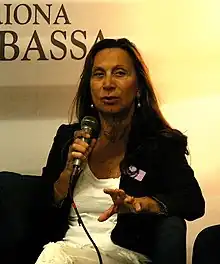Nuria Amat | |
|---|---|
 Amat at the Göteborg Book Fair 2014 | |
| Born | 1950 (age 73–74) Barcelona, Spain |
| Occupation |
|
| Alma mater | Autonomous University of Barcelona (PhD) |
| Notable awards | Ramon Llull Novel Award 2011 Amor i guerra |
| Website | |
| nuriaamat | |
Nuria Amat Noguera, spelled in Catalan as Núria Amat i Noguera (born 1950) is a Spanish writer and librarian who writes in Spanish and Catalan. She is the recipient of the 2011 Ramon Llull Novel Award.
Early life and education
Nuria Amat was born in 1950, in Barcelona.[1] She gained a degree in Spanish studies,[1] then completed a doctorate in information science[1][2] at the Autonomous University of Barcelona.[3]
Career
Amat wrote some studies on library science,[1] worked as a librarian, and taught library science at the University of Barcelona.[2] Her first non-scholarly published work was a tome of poetry called Pan de boda (1979).[1] Amat went on to write essays,[3] short story collections and novels in Spanish.[1] She was part of the Barcelona literary scene of the 1970s and 1980s, maintaining friendships with such writers as Juan Goytisolo, Carlos Fuentes, Josep María Castellet or Enrique Vila-Matas.[4]
Amat's literary work is often complex in form and focused on the processes of reading and writing, frequently employing metafiction.[2] Her body of work includes the novel Todos somos Kafka, which both reflects on the literary tradition and its own structure;[2] it was called "magnificent" by Carlos Fuentes in El País.[5] In 2002, Amat won the Premio Ciudad de Barcelona for Reina de América[3] – a novel about a Spanish woman writer living through a civil war in Colombia.[6] Her books have been translated to Arabic, English, French, Italian, Hungarian, Portuguese, Romanian, Swedish,[3] Czech[7] and Polish.[8]
Apart from writing in Spanish, Amat has also been published in Catalan. She has written a theatre play called Pat's Room (1997)[1] and a novel Amor i guerra about the assassination of Leon Trotsky by Ramón Mercader, with whom she is distantly related from the mother's side.[9] The novel brought her the Ramon Llull Novel Award 2011.[1][9] Amat started writing notes for the novel in both Catalan and Spanish, but then decided to write the whole book in Catalan, later creating a Spanish version.[9]
Amat has been vocal about rejecting the normalization of the Catalan language carried out by the Generalitat de Catalunya.[1]
Literary works
Fiction
- Narciso y Armonía, 1982[1]
- El ladrón de libros, 1988
- Amor Breve, 1990
- Monstruos, 1991
- Todos somos Kafka, 1993
- Viajar es muy difícil, 1995
- La intimidad, 1997
- El país del alma, 1999
- El siglo de las mujeres, 2000
- Reina de América, 2001; Eng. edition: Queen Cocaine, trans. by Peter Bush, 2005[6]
- Deja que la vida llueva sobre mí, 2007
- Amor i guerra, 2011[10]
- Amor y Guerra, 2012[9]
- El sanatorio, 2016[11]
Poetry
- Pan de boda, 1979
- Amor infiel, 2004
- Poemas impuros, 2008[10]
Other
References
- 1 2 3 4 5 6 7 8 9 10 11 "Núria Amat i Noguera". Gran Enciclopèdia Catalana. Retrieved 2023-03-23.
- 1 2 3 4 Amago, Samuel (2006). "Narrative Schizophrenia and the Anxiety of Influence in the Novels of Nuria Amat". True Lies: Narrative Self-consciousness in the Contemporary Spanish Novel. Bucknell University Press. pp. 95–99. ISBN 978-0-8387-5661-4.
- 1 2 3 4 "On Historical Memory: A Conversation between Nuria Amat and David Rieff". AS/COA. Retrieved 2023-03-23.
- ↑ "Nuria Amat: "En Barcelona se discriminaba a los latinoamericanos que no pertenecían al 'boom'"". El Español (in Spanish). 2022-07-21. Retrieved 2023-03-23.
- ↑ Fuentes, Carlos (2004-09-24). "La sombra dilatada de Kafka". El País (in Spanish). ISSN 1134-6582. Retrieved 2023-03-23.
- 1 2 "QUEEN COCAINE by Nuria Amat". Publishers Weekly. Retrieved 2023-03-23.
- ↑ Amat, Núria (2009). Ať na mě prší život (in Czech). Translated by Marie Jungmannová. Praha: Odeon. ISBN 978-80-207-1305-6. OCLC 1186995195.
- ↑ "Kraina duszy / Nuria Amat ; przekł. Katarzyna Jachimska-Małkiewicz". Biblioteka Narodowa (in Polish). Retrieved 2023-03-23.
- 1 2 3 4 "Núria Amat gana el Premio Ramon Llull con una novela ambientada en la Barcelona de 1936". El País (in Spanish). 2011-02-03. ISSN 1134-6582. Retrieved 2023-03-23.
- 1 2 "Amat, Nuria". www.escritores.org (in Spanish). Retrieved 2023-03-23.
- ↑ "Nueva novela de Nuria Amat: 'El sanatorio'". ED Libros (in Spanish). Retrieved 2023-03-23.
- ↑ Caballé, Anna (2022-08-06). "'Memorias de una mujer libre', una vida sin rodeos". El País (in Spanish). Retrieved 2023-03-23.